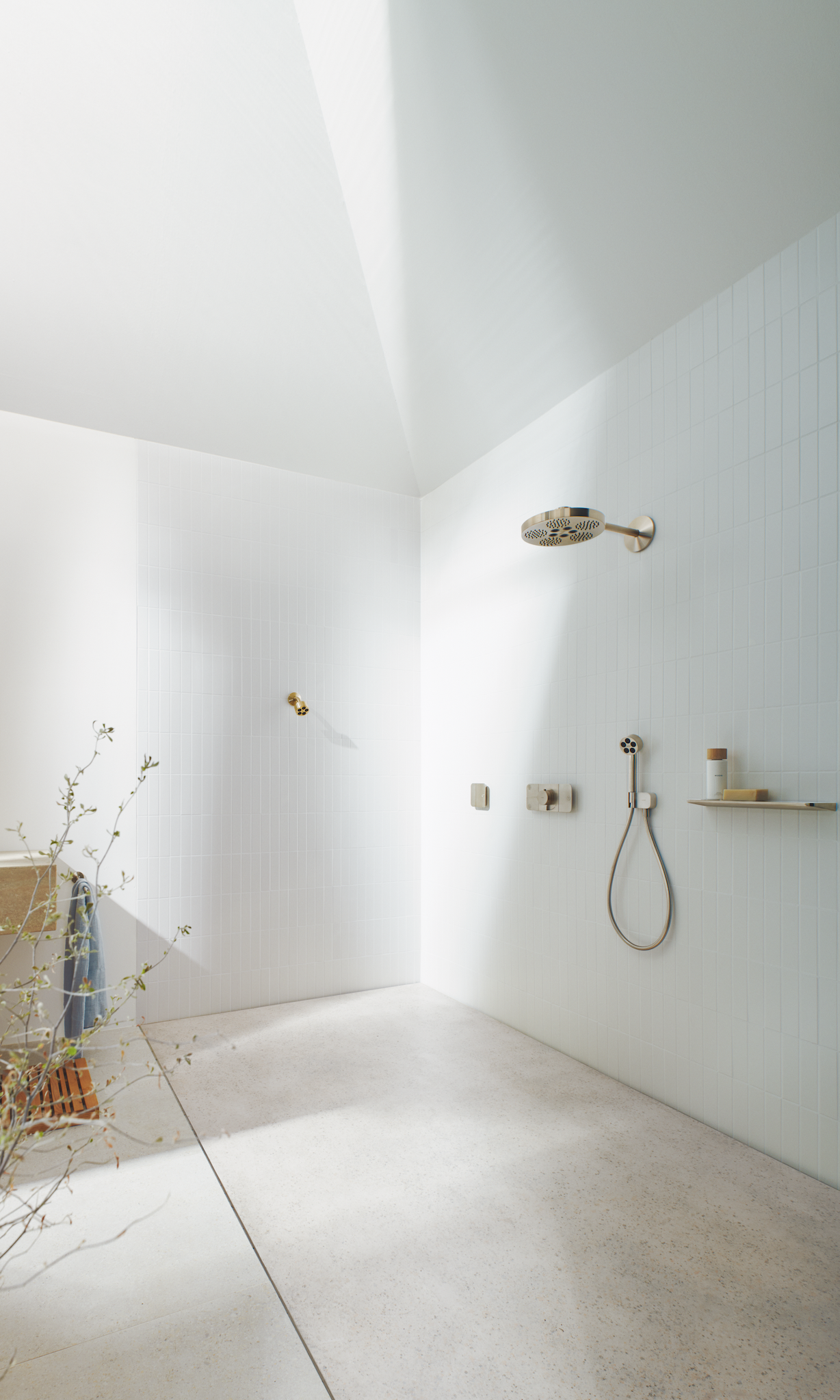Compact Luxury
A Foresight Report for AXOR
The future of luxury will look very different from how we envision it today. As younger generations reassess what luxury means – prioritising lifestyles and access over materialism and ownership – the definition of 'high end’ will continue to evolve. AXOR commissioned The Future Laboratory to produce a new foresight report identifying the emerging trends driving change
The emerging Compact Luxury trend favours the simple over the superfluous. Especially in compact spaces, people are seeking ways to personalise and customise the available living area to suit their values and interests. They are opting for sustainable appliances that can be individualised. Increasingly, luxury is becoming aligned with concern for the planet, and many high-end consumers now link personal satisfaction with low-impact products that boost collective and environmental well-being.
The Compact Luxury report, developed by the Future Laboratory in partnership with AXOR, uncovers the major influences of urbanisation, which are having a deep and lasting impact on the way we think about our ever-shrinking living spaces in the city of the future.
“The Future Lab have been the ideal sparing partner in the development of our brand insights on future living spaces. Our first-time partnership has shown us that they are a great collaborator when it comes to complementing our industry expertise on interior and product design in the bathroom, with consumer behaviour insights and future mindsets.”
Anke Sohn, Head of Global Brand Marketing AXOR.
: The Trends
 AXOR, Copenhagen
AXOR, Copenhagen
Luxury living spaces are changing. Rapid urbanisation has lifted consumers’ expectations higher than ever and left space at a premium. Meanwhile, the function and design of spaces are being transformed by luxury consumers’ shifting priorities.
In response, a new notion of Compact Luxury is emerging that encapsulates the modern high end in a streamlined space. Design is being refined to be perfectly sufficient rather than excessively material, and to favour a simple, rather than a superfluous, approach.
The three emerging trends that we identified are:
: Liberated Living
How a boundaryless mindset is emerging among consumers, driven by a desire for flexibility.
: Immaterial Affluence
How consumers are forgoing traditional markers of wealth, embracing increasingly immaterial forms of luxury instead.
: Conscious Wellbeing
How consumer concern around urban living is driving a desire for spaces that support individual and collective wellbeing.
In this report, we explore the social, cultural and technological forces that a reshaping these trends, reveal the drivers behind the emergence of new behaviours, and uncover the future Compact Luxury innovations that they will inspire.
‘There’s a move towards seeing yourself as flexible and mobile, so your sense of self and the way you establish an identity is not necessarily now tied to establishing roots.’
Simon Saint, Principal at Woods Bagot
: Microtrends Bathrooms
In response to rapid urbanisation, luxury consumers are looking to consume more consciously, less conspicuously, and more flexibly than ever before. These needs are naturally impacting design decisions as each space in the home undergoes transformation. Bathrooms are a space for personal care and relaxation. As such, they will come into focus particularly as a place to tend to one’s wellbeing away from the hyper-stimulation of the city.
As designers begin to consider the bathroom of the future, the following microtrends will emerge:
: Net-positive Bathrooms
As consumers become more. environmentally conscious than ever before, consumers are already causing a shift in how buildings are designed and considered. Simon Saint notes that the next step after net-zero will be regenerative spaces: People are beginning to embrace net-zero as a new standard, and the next thing on from that will be spaces that can actually regenerate and have a positive impact within the wider city.
: Programmable Places
As technology develops, spaces will become hyperpersonalised through smart features that can adapt to each individual occupant — meaning, even in a shared space, a level of temporary customisation will be achievable.
: Sanitised Sanctuaries
COVID -19 has underscored the need for heightened sanitation and made consumers more demanding of it than ever before. Promisingly, many emerging innovations contain a dual hygiene- benefit: touch-free faucets, for instance, can not only sense usage to prevent excess water waste but also prevent contamination and the spread of germs with fewer contact points.
Discover our Equilibrium Cities macrotrend on LS:N Global – demanding a more receptive and equitable built environment that will allow future urban generations, nature and businesses to thrive.
‘[Bathrooms] will come into focus particularly as a place to tend to one’s wellbeing away from the hyper-stimulation of the city. ’
: Lab Notes
As consumers reassess what identity means to them, they will expect increasing flexibility in their homes and the fixtures that come with them. Brands must consider how compact design can support a tetherless identity. Wealthy consumers are no longer looking for excess but instead for streamlined living. Brands must explore how compact spaces can support consumers who are looking for simplification. Wealthy consumers are more conscientious than ever. Create goods and services that help to support and convey their awareness of people, the planet and social causes.
Luxury brands are embracing the sharing economy. Now, wealthy consumers want access to democratic yet memorable experiences. While technology has contributed to our accelerated pace of life, there are opportunities for brands to use it in a more mindful and minimal way. Brands must help consumers to better understand their own bodies and psyches in the bathroom setting, even when space is restricted.
The ability to decelerate successfully will become completely democratised. Brands must seek to integrate moments of calm into everyday life, from silent cafés to meditative bathroom rituals in enclosed spaces that enhance privacy. Our understanding of wellbeing is shifting. Post-pandemic, people will understand that a healthy community not only embraces individual wellbeing but is rooted in good-quality interior and exterior environments.
Compact Luxury is about bringing notions of luxury to consumers in few square meters. Brands must explore how to streamline every centimeter of available space to boost serenity and wellbeing.
To learn more from about Compact Luxury, download the full report here.
If you are interested in finding out more about our Foresight reports that combine quantitative and qualitative research with original case studies and innovations to achieve your business objectives, click here.
For more about our client reports and case studies, get in touch with a member of our team.
FIND OUT MORE
